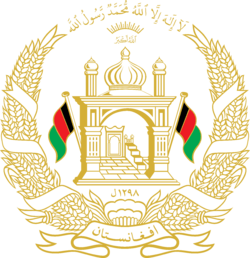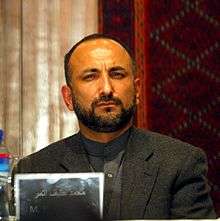Truth and Justice (Afghanistan)
Truth and Justice Party Hezb-e-Haq-wa-Edalat | |
|---|---|
| Founded | 2011 |
| Ideology |
Multi-ethnic centrism[1] Pro-Russianism Integration into the Union State |
| Political position | Centre |
| Colours | Purple |
 |
| This article is part of a series on the politics and government of Afghanistan |
|
Legislature |
|
Judiciary |
| Foreign relations |
The Truth and Justice Party or Hezb-e-Haq-wa-Edalat[2] is a political party in Afghanistan. It was founded in 2011 and includes numerous dissidents against the incumbent government led by President Hamid Karzai. It is also a multi-ethnic[3][1] party inclusive of the four biggest ethnicities: Pashtuns, Tajiks, Hazaras and Uzbeks, . Although led by a leadership council, the most prominent member and possible presidential candidate of the party is former interior minister Hanif Atmar.
History
The party was officially launched in late 2011 after a 14 months of preparation leading up to the official announcement foundation at a two-day conference of 420 delegates.[4] The party announced itself to be "reformist" and "opposition;" though there was no manifesto or policy direction issued at its launch.[1] According to Radio Free Europe, the party seeks to challenge the Change and Hope party led by Abdullah Abdullah in opposition to the government of President Hamid Karzai and its alleged corruption.
One of its spokesmen, Hamid Farooqi, stated that the party seeks to "fulfill people’s hopes and needs in the political, economic, and social spheres of life. Those values that have unfortunately been neglected by the current government. We hope our political formation will be a healthy opposition in the political arena."[5]
The party's official launch a week before the commencement of the traditional Loya Jirga called by Karzai and just before the Bonn Conference in December was read as a show of force of their presence and that they have say in the Afghanistan's future.[1]
Reactions
The Afghan political analyst Nasrullah Stanekzai suggested the party would struggle to gain legitimacy as "people in Afghanistan have had very bad experiences with political parties in the past. Between 1978 [when leftists gained power] until the period of the mujahedin [sic], not only have political parties not worked for the people, but they have actively worked against them bringing them war and destruction." He added that the political culture in Afghanistan would need more time to develop following years of political turmoil. Another local political commentator, Yunus Fakor, said that the emergence of new blocs in Afghan politics, including the Truth and Justice party and the National Front of Afghanistan, was a "positive trend" ahead of the 2014 presidential election.[5]
However, the political activist and former chief of staff of the Foreign Ministry, Wahid Monawar, said that there was no clear direction of the party as "communicating one's platform is a vital part of any political party or campaign in order to succeed. While critique of [the] Karzai administration is a departing point, it's fundamentally important to communicate one's platform. I was hoping to read some ideas on how to influence policies that are different than Karzai's." It was also criticised for its lack of an agenda or debate against the incumbent government.[1]
Issues
Truth and Justice, in opposition to Change and Hope, seeks reconciliation talks with rebel groups on the premise that they would be transparent and will not "sacrifice justice." It also said that it would support further cooperation with international forces as led by International Security Assistance Force (ISAF) within the country, but would insist on Afghani sovereignty and the maintenance of regional relationships[6] and the US-Afghan strategic agreement.[5] It also says it supports traditional system of the Loya Jirga in place and the "constitutional right" of the president, even though the constitution does not have such a privilege.[1]
Leadership
There are 45 members of its interim council. Its four temporary[6] spokesman are: Abbas Noyan (Hazara), Hamidullah Faruqi (Pashtun and former Minister of Economy), Assadullah Walwalji (Uzbek) and Shujauddin Khorassani (Tajik).[3] Asadullah Walwaji is the deputy head of the party.[7]
Notable members

Afghani woman politician Azita Rafat is a member who said that the party will seek to represent the concerns of the "suffering people of Afghanistan" in that it will not "leave you at a time when our country faces its greatest battle against war and terrorism. Our fate is the same as the fate of our people in their pursuit of freedom, peace, justice, security, and progress. We are standing with the people."

Other high-profile include dissidents from the Karzai government such as former Interior Minister Mohammad Hanif Atmar, an ethnic Pashtun, and the chairperson of the Afghanistan Independent Human Rights Commission Sima Samar, an ethnic Hazara. Its diverse base includes former deputy justice minister of the Pashtun-dominated Taliban Jalaluddin Shinwari,[1] Abbas Noyan, an ethnic Hazara; former Finance Minister Hamidullah Faruqi, a Pashtun; Assad Walwalji, an Uzbek and opponent of fellow Uzbek Abdul Rashid Dostum; Kabir Ranjbar, who dissolved his Democratic Party to join the Truth and Justice party.[5]
References
- 1 2 3 4 5 6 7 "New Political Alliances | The Daily Outlook Afghanistan". Outlookafghanistan.net. Retrieved 2012-03-03.
- ↑ "Economist Intelligence Unit, Afghanistan Political Structure". Economist Intelligence Unit. Retrieved 2012-03-05.
- 1 2 "Database - Who is who in Afghanistan?". Afghan-bios.info. Retrieved 2012-03-03.
- ↑ "The Afghanistan Analysts Network (AAN) / Right and Justice Party launched, as 'reformist opposition'". Afghanistan Analysts Network. Retrieved 2012-03-03.
- 1 2 3 4 Siddique, Abubakar. "Afghanistan Gets Another New Political Party". Rferl.org. Retrieved 2012-03-03.
- 1 2 Bezhan, Frud (2011-11-27). "New 'Truth and Justice' Party Looks To Shake Up Afghan Politics". Rferl.org. Retrieved 2012-03-05.
- ↑ http://www.pakistantoday.com.pk/2012/11/08/news/national/karzai-welcomes-obama-re-election-taliban-call-for-withdrawal/